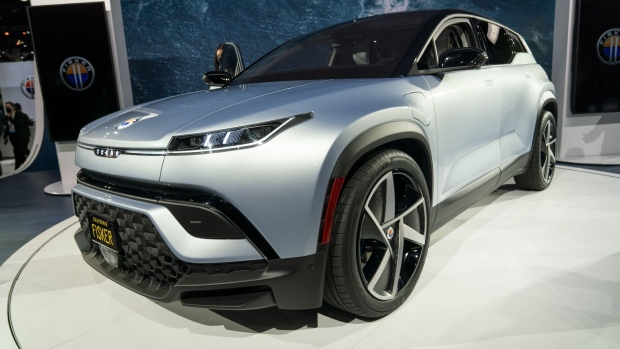May 8, 2023
Fisker's Debut SUV Delayed by Lingering Software Problems
, Bloomberg News

(Bloomberg) -- Fisker Inc. is facing delays delivering its debut electric SUV to customers because of software integration problems, people familiar with the matter said.
The EV startup has more testing and troubleshooting to do with its Ocean sport utility vehicle, according to two people who asked not to be named because the company hasn’t disclosed the information. The software is currently prone to glitches, the people said, estimating the issues could take months to iron out. As a result, they said some vehicles are only using a more basic software that limits their speed.
Fisker said in an emailed statement late Monday that its vehicles will be updated over-the-air this year after launching with a basic driver-assistance system. “We categorically deny that the Fisker Ocean can be driven at only low speeds,” the company said.
Following Bloomberg’s report, Fisker cut its forecast for Ocean production this year by at least 15%, citing changes to timelines for regulatory approvals and supplier readiness. The company said Tuesday it’s now expecting output of between 32,000 and 36,000 vehicles, down from 42,400 previously.
Fisker also postponed the launch of its second EV — called Pear, which will be made by Foxconn Technology Group — to 2025 instead of next year.
Fisker shares fell 14% to $5.72 as of 9:34 a.m. in New York. The stock was down 8.9% this year as of the close on Monday.
A representative for Magna International Inc., whose contract-manufacturing subsidiary in Graz, Austria, started producing Oceans in November, declined to comment and directed all questions to Fisker.
Fisker delivered its first Ocean last week to a customer in Denmark. But the vehicle is being prepared to be sent back to Magna’s plant in Austria, according to one of the people, who said the software problems rendered the SUV inoperable.
Henrik Fisker, the company’s chief executive officer, told analysts on a conference call Tuesday the vehicle is still in Copenhagen.
The company has cautioned before that it was having issues with regulatory approvals, saying in February that it was anticipating testing for the US and Europe to be completed in March, instead of that month. While European regulators certified the Ocean in late April, the company is now expecting approvals from the US Environmental Protection Agency and California Air Resources Board this month, and to start deliveries there in June.
The Los Angeles-based company, which went public through a reverse merger in 2020, reported about $198,000 of revenue for the first quarter, short of $4.64 million average estimate of analysts surveyed by Bloomberg. Last year, Fisker said Magna could make as many as 50,000 Oceans in 2023, while reservations for the SUV have hovered around 65,000.
Struggles to make the jump from presenting a slick prototype to mass manufacturing are common in the auto industry, even for established companies. Tesla Inc. famously went through “production hell” ramping up output of its Model 3 sedan. Volkswagen AG has had issues with its EVs and on Monday tapped a new leader to oversee its software division, called Cariad.
(Corrects eighth paragraph in story originally published May 8 to be more precise about status of the car on that date.)
©2023 Bloomberg L.P.





